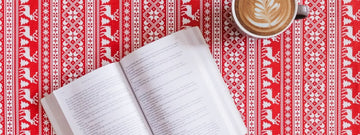
If you have a couple of books that you haven't read for a long time, there is a high chance that it can be damaged by insects.
Today, I will tell you all about insects and how to protect your books from them.
Lets's get started!
Do Insects Live in Your Books?
Insects enjoy dark and humid places, so if your books are in the dark, humid places, insects will make your books their new home.
Living in the binds on the pages, they feed on the paper of the cloth of your books for the protein your book has to offer. Thus destroying your pages with feces and making the edges of your pages ruff.
Why Insects Attack Your Books
Although insect-like to consume the protein in your books for the protein, they do attend to leave their feces on your pages, destroying the book's materials.
Also, bugs see books as another form of food, and even though you worked so hard to collect your precious books, Cockroaches love to eat the bindings of cloth books, leaving behind rough edges.
What Insects Can Do To Your Books
Once you start to notice an infestation, you will want to isolate all your affected books. Sometimes, you can get rid of the inside, destroying, putting them in a plastic zip-lock bag, and sticking them into the freezer, thus killing the insects.
Pssst! No time for reading? Click here to reveal how to read a whole book in 15 minutes!
If you tend to have a library in your home, you will need to make the area moisture-free from the air and free from dust. Doing all this will prevent the attack of the "Bugs."
What Kind Of Insects Are There In Your Books
Silverfish
The "Silverfish" having been roaming around for more than 400 million years. Long Time Right!
The Silverfish have not evolved much since their dinosaur years. Only in their size may they have changed a tiny bit. Silverfish enjoy dining on glue and the paper of your book.
Their chill-out spot is generally the dark corners the only time they make an appearance is at night. A Silverfish's body looks like a "carrot." The Silverfish skinny pointed-shaped body and a round head that goes all the way down to their abdomen area.
Silverfish off no beneficial purpose and are not harmful to humans. So do not worry yourself to death over getting rid of them. They love dark, humid spots that people don't intend to go like your attic, garage, or even your basement. If you happen to cross paths with a Silverfish, just vacuum it up, and that will get rid of it.
Cockroach
The cockroach tends to leave brown liquid down the pages of your books when they have not dinned on the bindings of the paper, having flat bodies with every wing, creepy skittery legs that are long.
Cockroaches enjoy eating waste and garbage and spread bacteria like shigella and salmonella wherever they go. Where ever cockroaches will walk, they leave behind their feces. Extremely hard to get rid of cockroaches, and they are nocturnal, and if you happen to see them during the day, it could very well be they have taken over, and there is nowhere left to hide.
They tend to multiply much faster and make it harder for you to get rid of them. So how should you get rid of them? Well, did you know if there were ever to be a nuclear war, the cockroaches would survive?
The reason is that their bodies do not continuously divide like human cells because it would protect them if there ever were a nuclear war. When getting rid of them, you will want to get traps before you buy and spray. The reason being is that you will be able to look inside the trap to see if it had caught any cockroaches. If not, you can keep moving it around until you find its nest.
Bookworms
Yes, there is an actual bookworm that will dine on your book. Bookworms slither through a book eating the pages and laying their eggs, and they are called booklice.
They are not anything like head lice. They love to dine on the glue, pages, and even fungus. Booklice tend to stay in the dark in a dusty old corner.
So how should you kill the Booklice? You will want to reduce the moisture by getting a dehumidifier. You will want to use vinegar, bleach, or even another chemical to kill the booklice. You might want to put a fan in the room or open the windows to ventilation.
Termites
Loving wood termites are very much attracted to your wooden bookshelf once near your books; they will feed upon the pages. Termites will do some damage and are usually known as silent destroyers. Termites eat a plant-based material ( cellulose ).
Some homes could have it between their walls. Termites make their way to your home by crossing colonies going from one colony's yard to another, and then crawling through the cracks and the gaps and around any wires and even pipes, giving them access into the home. You will need to call Orkin to put out some dry foam which is bait and will kill them.
How To Protect Books From Insects And How To Get Rid Of Them
Once you have found the infestation, you will need to take your books and isolate them by putting them into plastic ziplock bags and sticking them in the freezer.
By doing this, it will kill the insects. You will also want to keep your bookshelf free from moisture and even dust. Doing this will help by keeping thises insects away. Doing this does not simply help get rid of the book bugs.
Having water in the air can cause fungus and even mold with temps around seventy degrees. You will want to get a dehumidifier, and how that will help you will be for sucking out all the moisture out of the air in the room.
Also, if there is too little humidity that may dry out your books, then that is when the humidifiers will help your books. from drying out.
Dust is also a moisture magnet, even mildew, so you will want to keep the top of your book dusted with having the humidifier. You might want to put a fan near your bookshelf; Thus, keeping the air-ventilated, extreme heat can damage your books. If there is heat in the room with no humidity, then your pages will be as brittle because the fiber in the books had dehydrated.
While getting rid of mice, you will want to get dog food if you have any animals and put them into a sealed container. You will want to keep your food in bulk in a large metal container.
Try to remove all your debris and grass from around your home. Make sure you trim your shrubs and branches and make sure they are not touching your house. You will want to store food wood away from your home.
Make sure there is not paper or cardboard lying around inside or outside of your home. Well, trapping the mouse is generally preferred than letting it loose far away from your home. Using traps doesn't mean you always use poison with the traps. Some have a metal strap that has a powerful snap.
So, if the mouse crawls up to eat the snack you had left, cause the belt to snap and kill the mouse/rat. Glue traps are cardboard with a plastic strip with glue that will attach the mouse/rat to the piece of cardboard.
You could also do baiting, in which case could be horrible because after leaving the bait out, the rodent could then make its way through your walls and die, making it harder for you to find it. Or the live traps catching them and then releasing them back to the wild, and then they may get back into your house if not taken too far.





